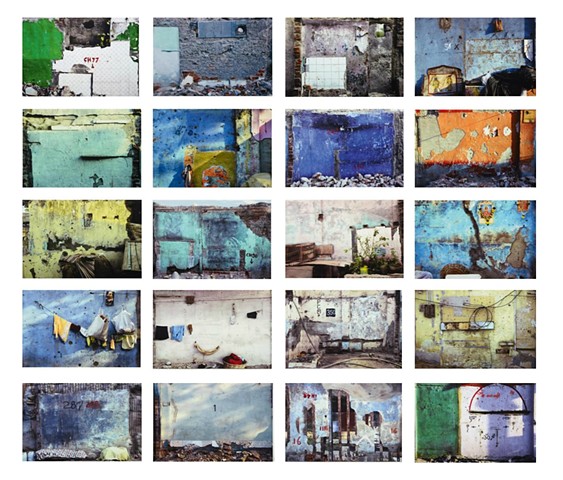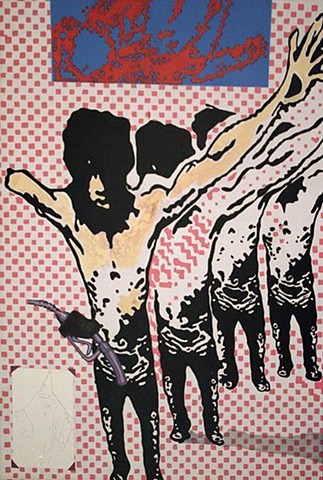Kallat, Jitish
JITISH KALLAT
1974 Born in Mumbai, India
Lives and works in Mumbai, India
EDUCATION
1996–97 Fellow at the Sir J.J. School of Art, Mumbai, India
1990–96 BFA (painting), Sir J.J. School of Art, Mumbai, India
SELECTED SOLO EXHIBITIONS
2011 Fieldnotes: tomorrow was here yesterday, Dr. Bhau Daji Lad
Mumbai City Museum
Stations of a Pause, Chemould Prescott Road, Mumbai
2010 Public Notice 3, Art Institute of Chicago
The Astronomy of the Subway, Haunch of Venison, London
Likewise, Galerie Arndt, Berlin
2008 Universal Recipient, Haunch of Venison, Zurich
2007 Sweatopia, Chemould Prescott Road and Bodhi Art
Unclaimed Baggage, Albion, London, UK
365 Lives, Arario Beijing, China
Rickshawpolis–3, Gallery Barry Keldoulis, Sydney, Australia
2006 Rickshawpolis–2, Spazio Piazza Sempione, Milan, Italy
2005 Rickshawpolis–1, Nature Morte, New Delhi, India
Panic Acid, Bodhi Art, Singapore, South East Asia
Humiliation Tax, Gallery Chemould, Mumbai, India
2004 The Lie of the Land, Walsh Gallery, Chicago, USA
FAQ, Art Rotterdam, presented by Willem Baars Projects, Holland, The Netherlands
2002 First Information Report, Bose Pacia Modern, New York, USA
2001 Milk Route, India Habitat Centre, New Delhi, India
General Essential, Sakshi Gallery, Bangalore, India
2000 Ibid., Gallery Chemould, Mumbai, India
1999 Private limited–I, Bose Pacia Modern, New York, USA
Private limited–II, Apparao Gallery, Chennai, India
1998 Apostrophe, India Habitat Centre, New Delhi, India
1997 P.T.O., Gallery Chemould and Prithvi Gallery, Mumbai, India
SELECTED GROUP EXHIBITIONS
2012 Arsenale 2012, Kiev Biennale
2011 Boundaries Obscured, Haunch of Venison, New York
2010 The Empire Strikes Back: Indian Art Today, Saatchi Gallery, London, UK
URBAN MANNERS 2, at SESC Pompeia, Sao Paulo
Indian Highway, HEART, Herning Museum of Contemporary Art, Copenhagen, Denmark
2009 Mythologies, Haunch of Venison London, UK
Indian Highway, Astrup Fearnley Museum of Modern Art, Oslo, Norway
2008 Indian Highway, Serpentine Gallery, London
Frontlines: Notations from the Contemporary Indian Urban, BodhiBerlin, Germany
Passage to India, Initial Access Frank Cohen Collection, Wolverhampton, UK
2007 Soft Power, Shanghai Zendai Museum of Art, Shanghai, China. Curator: Shen Qibin,
Binghui Huangfu and Biljana Ciric.
Mad Love - Young Art in Danish Private Collections, ARKEN Museum for Moderne Kunst,
Copenhagen, Denmark Best of Artists, ShContemporary, Shanghai. Curator: Pierre Huber, Shanghai, China
Urban Manners, Hangar Bicocca, Milan, Italy. Curator: Adelina Von Furstenberg
Hungry God, Art Gallery of Ontario, Toronto, Canada
INDIA NOW: Contemporary Indian Art Between Continuity and Transformation, Provincia di
Milano, Italy. Curator: Daniela Palazzoli
Aftershock, Sainsbury Center for Visual Arts, Norwich, UK
Horn Please, Kunstmuseum, Bern, Switzerland. Curator: Bernhard Fibicher
Asian Europe Mediation, National Museum of Poland, Poznan and Zendai Museum of
Modern Art in Shanghai, China. Co-curated by Binghui Huangfu
FIAC, Paris, France. Represented by Albion, London, UK
New Narratives: Contemporary Art From India, Chicago Cultural Center, Chicago, USA. Curator: Betty Seid
The Armory Show, New York, USA
Gulf Art Fair, Dubai
Thermocline of Art – New Asian Waves, ZKM Museum, Karlsruhe, Germany. Curators: Wonil Rhee and Peter Weibel
2006 The 5th Asia Pacific Triennial of Contemporary Art, Queensland Art Gallery and Gallery of
Modern Art, Brisbane, Australia
Passages, Palais des Beaux-Arts, Brussels. Curators: Deepak Ananth and Jany Lauga
Lille 3000, Lille, France
The 6th Gwangju Biennale, Gwangju, Korea. Curators: Binghui Huangfu, Wu Hung, Shaheen Merali
Hungry God: Indian Contemporary Art, Arario Gallery, Beijing and the Busan Museum, Korea
L’Art à la Plage, Galerie Enrico Navarra, Ramatuelle, France
Another Worlds, Arario Gallery, Cheonan, Korea
2005 Indian Summer, Ecole Nationale Supérieure des Beaux-Arts, Paris, France. Curators:
Deepak Ananth and Henry-Claude Cousseau
The Artist Lives and Works in Baroda/Bombay/Calcutta/Mysore/ Rotterdam/Trivandrum,
House of World Cultures, Berlin, Germany
1st Pocheon Asian Art Triennale, Pocheon, Korea. Curator: Yoon,
Jin Sup
Paths of Progression, Singapore Tyler Print Institute, Singapore, South East Asia.
Mom and Pop Art, Walsh Gallery, Chicago, USA
The Armory Show, New York, USA
International Painting, Gallery GBK, Sydney, Australia
Kunst En Oorlog, Kunst en Cultuur Noord-Holland, The Netherlands
2004 The Sacrifice – An Intimate I, Collection Swagemakers, Museum
De Beyerd, Holland, The Netherlands
Contemporary Art from India, Thomas Erben Gallery, New York, USA
Summer Show, Bose Pacia Gallery, New York, USA. Curator: Peter Nagy
Art Chicago. Presented by Walsh Gallery, Chicago, USA
Masala, William Benton Museum, University of Connecticut, USA. Curator: Kathryn Myers
Zoom! Art in Contemporary India, Culturgest, Lisbon, Portugal. Curators: Nancy Adajania and Luís Serpa
2003 SubTerrain: Artists Dig the Contemporary, House of World Cultures, Berlin, Germany. Curator: Geeta Kapur
Drawing Conclusions: Work by Artist-Critics, NY Arts Magazine Gallery, New York, USA. Curators: Jill Conner and Gae Savannah
Pictorial Transformations, National Art Gallery, Malaysia
Urban Graffiti, Woolf Gallery, London, UK
Crossing generations: diVERGE, Gallery Chemould’s 40th anniversary, National Gallery of Modern Art, Mumbai, India. Curators: Geeta Kapur and Chaitanya Sambrani
Indians+Cowboys, Gallery 4a, Sydney, Australia. Curators: Aaron Seeto and Ruth Watson
The Tree from the Seed, Henie Onstad Kunstsenter, Høvikodden, Norway. Curator: Gavin Jantjes
Arco 2003, Madrid, Spain
2002 Under Construction, The Japan Foundation Asia Center, Tokyo. Curator: Ranjit Hoskote
India – Contemporary Art from Northeastern Private Collection, Jane Voorhees Zimmerli Art
Museum, New Jersey, USA
Singapore Art Fair
Clicking into Place, Sakshi Gallery, Mumbai, India. Organised by Japan Foundation. Curator: Ranjit Hoskote
2001 Century City, Tate Modern, London, UK. Curators: Geeta Kapur and Ashish Rajadhyaksha
Indian Painting, Art Gallery of New South Wales, Sydney, Australia. Curator: Haema Sivanesan
Indian Contemporary Fine Arts, Seven Degrees, California, USA. Presented by Saffronart.com
2000 7th Havana Biennial, Havana, Cuba, Curator: Hilda Maria Rodriguez
KunstRAI, International Art Fair, Amsterdam, The Netherlands. Represented by Willem Baars
Art Consultancy, Amsterdam
1999 The First Fukuoka Asian Art Triennale, Fukuoka Asian Art Museum, Japan. Curator: Kuroda Raiji
Nature Morte, Mary Place Gallery, Sydney, Australia. Curator: Peter Nagy
1998 Art of the World 1998, Passage de Retz, Paris, France
Multimedia Art of the 90s, CIMA Gallery, Calcutta, India
Jehangir Nicholson Collection, National Gallery of Modern Art, Mumbai, India
The Wilberding Collection, National Gallery of Modern Art, Mumbai, India
Indian Contemporary Art, The R.P.G. collection, Leverkusen and Monheim, Germany
1997 Projektgruppe Stoffwechsel’s international art meet ‘Innenseite’, Kassel, Germany. Curator: Hamdi el Attar
50 Years of Art in Mumbai, National Gallery of Modern Art, Mumbai, India. Curator: Saryu Doshi
Major Collections
The Saatchi Gallery, London
MOCA Grand Avenue, Los Angeles
The Art Institute of Chicago, Chicago
Burger Collection, Berlin
National Gallery of Modern Art, Mumbai
Jitish Kallat (born 1974, Mumbai) is one of the most exciting and dynamic Asian artists to have received international recognition in recent years. Working across a variety of media including painting, sculpture, photography and installation, his work reflects a deep involvement with the city of his birth (Mumbai) and derives much of its visual language from his immediate urban environment. His subject matter has been described previously as 'the dirty, old, recycled and patched-together fabric of urban India'. Wider concerns include India's attempts to negotiate its entry into a globalised economy, addressing housing and transportation crises, city planning, caste and communal tensions, and government accountability.
Many of Kallat's works focus on Mumbai's downtrodden or dispossessed inhabitants, though treating them in a bold, colourful and highly graphic manner. His series of 'Dawn Chorus' paintings, for example, depicts the street urchins who take advantage of red traffic lights to sell books to commuters in Mumbai. Rather than focusing on their reduced circumstances, Kallat celebrates their resilience and their enterprising spirit. Each child's hair is a collision of traffic and pedestrians, forming a city that sits atop their heads. In this respect the paintings are double portraits, depictions of street urchins but also portraits of the claustrophobic and chaotic city, its countless narratives tumbling Medusa-like from each child's head. Kallat traditionally mounts these paintings on bronze sculptures that are re-created from the wall adornments found on the 120-year-old Victoria Terminus train station in the centre of Mumbai.
An ongoing preoccupation in Kallat's work, the theme of human struggle also dominates 'Cenotaph (A Deed of Transfer)'. The departure point for this series of twenty lenticulars was the demolition of a squatter settlement in which people's homes were reclaimed as city walls and quickly adorned with film posters and advertising bills. Kallat highlights the traces of assault made by the authorities by literally foregrounding them in the three-dimensional format of the lenticular print. The resulting image condenses the dramatic transformation of these contested spaces into a single frame.
The themes of hope and survival are further explored in the 'Friendly Fire (Clouds in the Water)' drawings, remediations of newspaper images which documented a bizarre episode in Mumbai's recent history. Widespread reports claimed a heavily polluted area of sea water around Mahim Creek had turned sweet, prompting thousands of Mumbaiites to bathe in and drink the murky water. Though the water in fact remained as polluted as ever, there was not a single instance of illness recorded from the mass cleansing. Kallat focuses on the emancipatory potential of this miracle, Mumbai's 'unclean' captured in a moment of communal joy and catharsis.
One of his most ambitious works to date, the mammoth 7 metre long sculpture 'Aquasaurus' forms the centrepiece of Kallat's first exhibition with Haunch of Venison. The latest in Kallat's series of skeletal sculptures, it is a life-size recreation of one of the water tankers common to Mumbai's streets. Fashioned from bones and dramatically lit in the manner of a natural history display, it is reminiscent of a prehistoric skeleton: 'the abandoned carcass of an antiquated automobile in the fast-changing Indian streetscape', according to the artist.
Jitish Kallat studied painting at the Sir J.J. School of Art in Mumbai and has participated in numerous solo and group exhibitions internationally. In addition to his inclusion in important museum exhibitions such as 'Thermocline of Art - New Asian Waves' at the ZKM Museum in Karlsruhe (2007) and 'Century City' at Tate Modern in London (2001), Kallat has participated widely in biennials and triennials, including The 5th Asia Pacific Triennial of Contemporary Art in Australia (2006) and The 6th Gwangju Biennale in Korea (2006). Recent solo exhibitions have taken place with galleries in Beijing, London and Mumbai. Kallat's work is held in a number of important public and private collections internationally including MOCA, Los Angeles, the Saatchi collection and the Frank Cohen collection. 'Universal Recipient' is Jitish Kallat's first exhibition with Haunch of Venison.

